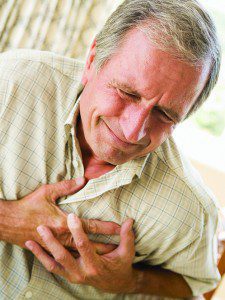

Heart attacks kill more people in the U.S. than any other single disease, and the most common symptom people have from a heart attack is chest pain. The term “chest pain” is actually misleading. Heart pain is not always described as being painful, and it’s not always in the chest. Sadly, people die because they ignore pains that could be signs of a heart attack and don’t seek medical help.
When Is Chest Pain a Heart Attack?
So how can you tell if you should worry about chest pain symptoms? There are two main factors that help decide when to worry and when to safely rule out heart disease: the actual symptom, and the risk of the person having those symptoms.
The typical symptoms of heart related chest pain are:
• Chest “tightness,” “squeezing,” or “heaviness.” People describe this feeling as a weight or as a band being tightened around their chest. The pain is usually located on the left side of the chest above the bottom of the ribcage, but it’s often hard to define its exact location.
• Shortness of breath
• Sweating, nausea, and an anxious feeling
• A pain in the left arm, neck, and jaw
What are Other Symptoms of a Heart Attack?
Those are the typical symptoms, and the presence of all of the above symptoms certainly is cause for worry. But many people have other, atypical symptoms that are still cause for concern:
• Pain isn’t on the left side: Sometimes the pain is not on the left, but on the right, the center, or even at the top of the abdomen.
• Absence of pain: Some people have no pain at all; instead they just have shortness of breath. One study showed that nearly 1/3 of people having a heart attack didn’t have pain
• Sharper pain: Some experience a sharper pain, or a feeling of indigestion.
How Long Does Chest Pain Related to a Heart Attack Last?
Aside from what the chest pain feels like, you should pay attention to how long the pain lasts. Chest pain related to a heart attack usually occurs over several minutes, not suddenly. Severe pain that comes on suddenly may be something else serious, but it’s not consistent with a heart attack. Heart chest pain almost always lasts at least five minutes, and doesn’t continuously last more than twenty to thirty minutes. Finally, pain that comes on at rest or exertion that doesn’t go away with rest is more serious and more indicative of a heart attack.
This is not to say pain that comes and goes isn’t worrisome; it’s just not consistent with a heart attack. Pain that comes on after exercise but consistently goes away with rest may represent a narrowing of the blood vessels that supply blood to the heart. That could lead to a heart attack, but it isn’t an emergency unless it doesn’t go away after five minutes of rest.
What are the Risk Factors for a Heart Attack?
The other major things to consider when determining whether your chest pain is a heart-related emergency are the risk factors. It’s a big difference when a 20-year-old woman comes in with chest pain compared to a 50-year-old male diabetic who smokes.
The risk factors for heart attacks include:
Age – risk for heart attacks begin to rise for men at age 40 and women at 50. It can still happen earlier, but it’s less likely.
Sex – men are at higher risk than women, al-though the disease still kills a large number of women each year.
Genetics – if a member of your immediate family has coronary heart disease, your risk is substantially higher. That risk is especially high if that family member is a man under 50 or a woman under 60.
Smoking – people often think of smoking as a danger to the lungs (which it is), but the biggest risk of death from smoking is from heart attacks. I recommend my patients to quit smoking and take up something safer, like tightrope walking, javelin catching, or training pit bulls.
Having high blood pressure, high cholesterol and diabetes also increases risk.
When is Chest Pain NOT a Heart Attack?
There are some symptoms that can reassure me chest pain isn’t related to the heart:
Pain that is sharp and brief – stabbing pain that lasts a few seconds is not from the heart.
Pain that persists for hours – heart chest pain will either go away after 20-30 minutes, or will end up in a heart attack.
Pain that gets worse with movement – or pain that gets worse when you press on that area of the chest is probably from the muscles or the bones in the chest, not the heart.
Pain that you can point to with a single finger – heart pain tends to be hard to pinpoint.
Learning the symptoms of heart pain and knowing your risk factors can save your life or that of a loved one. IF you have any doubt, it’s always best to get things checked out. It’s far better to be seen for symptoms that are not serious than to ignore serious symptoms.
Cardiac Care Group, LLC
(239) 574-8463
www.flccg.com
Dr. Scala has been selected a Castle Connolly 2015 “Top Doctor” by a physician-led team of researchers in the field of Cardiovascular Disease.
Our Cardiologist
Dr. Louis J. Scala has been voted TOP DOCTOR four consecutive years by Castle Connolly. He received his medical degree at the State University of New York Health Science Center. He completed his Residency at Brown University, and Cardiology Fellowship at Cedars-Sinai Medical Center at UCLA. He is Board Certified in Internal Medicine and specializes in Cardiovascular Disease.
South Cape Business Center
3208 Chiquita Blvd. S, Suite 110
Cape Coral, FL 33914
(239) 574-8463
www.flccg.com
 Southwest Florida's Health and Wellness Magazine Health and Wellness Articles
Southwest Florida's Health and Wellness Magazine Health and Wellness Articles

